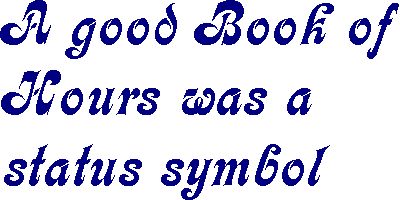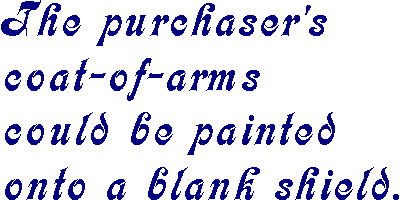



 |
 |
 |
 |
 |
 |
The Miniature Book Society, Inc. is an international non-profit organization chartered in 1983 by the State of Ohio. Its purposes are to
sustain an interest in all phases of miniature books; to provide a forum for the exchange of ideas and to serve as a clearing house for information
about miniature books.

MEMBERSHIP
Membership in the Miniature Book Society, Inc. is open to all who have an interest in miniature books. USA dues are $25 individual and $35 couple/corporate; Non-USA dues are $40 individual and $50 couple/corporate. You may obtain a membership request form from Loretta Gentile,
10 Albert St., Waltham MA 02154.
Current offices are held by: Doris Selmer, President; Donn Sanford, Vice President; Michael Canoso, Secretary; Loretta Gentile, Treasurer.
As of August, 1996, we have 410 members, and growing.
- USA ....................................370
- England...................................9
- Canada....................................8
- Netherlands.............................4
- Scotland..................................2
- Germany.................................4
- Australia.................................3
- Israel.......................................2
- Japan.......................................2
- Hungary..................................1
- Slovenia..................................1
- Switzerland.............................1
- South Africa...........................1
We would like to welcome our newest members: Peggy Whitney Hobbs, Bethlehem PA; Lynn Berkowitz, Slatedale PA; JoAnna
Poehlmann, Milwaukee WI; Elizabeth Sica, Kutztown PA; Robert C. Bradbury, Worcester MA; Kandy Vermeer Phillips, Gaithersburg MD;
Ronald Wood, Louisville KY.

CONCLAVE XV
The MBS Conclave XV will be held in Bethlehem PA on Labor Day weekend 1997, August 29, 30, 31 and September 1. The committee,
which is already working hard to make this a great conclave, is headed by Jane W. Conneen, proprietor of The Little Farm Press. Others on the
committee are: Olga Conneen, coordinator of youth services at the Bethlehem Public Library; Larry M. Miley, treasurer and
menu planner, proprietor of Sunflower Unlimited; Philip Metzger, curator of special collections at the Linderman Library, Lehigh University;
Diane Shaw, curator of special collections at the Skillman Library, Lafayette College; Kathy McAuley Richards of the Lehigh College of Arts
and Sciences, publicity; Alden Jacobs, recently retired from the Life Insurance and Hotel & Motel Associations, arranging side trips to good
book, museum and art locations in and near Bethlehem.
Saturday
We will be traveling through the rural Pennsylvania countryside to the Ephrata
Cloister, home of one of the earliest complete publishing centers in Colonial America. We will see fascinating wooden buildings with high-pitched
roofs and tiers of dormer windows - early Germanic architecture built between 1732 and the Revolution. From there we go on to Lancaster to
browse among four antiquarian bookshops, take a look at the famous Farmer's Market and visit the Heritage Museum to see quilts, folk art,
fine early American furniture and more.
Saturday evening
Philip Metzger, Curator of Special Collections, has invited us to a reception
at the Linderman Library at Lehigh University where there will also be an exhibit of Miniature Books.
Sunday
The Member's Book Fair is open to members from 9:00 to 10:30 and to the public
from 10:30 to 4:00 in the afternoon.
Ed Hutchins will be giving two workshops - "Making A Book Out of One Piece of Paper" and
"Pop-up Miniature Books." These workshops will be limited in size. Those interested should sign up as soon as the registration forms
arrive.
The Annual Member's Banquet will be held that evening.
More activities are planned. Stay tuned!
up to the top

ARTICLES
THE EARLY MAKING OF MANUSCRIPTS
by Sandra Miesel
Manuscripts were created to suit different classes of consumers. Book loving aristocrats sometimes
maintained artists on retainer,as the French Duke of Berry did with the three Brothers Limbourg, the finest miniature painters, about 1400.
Later in that century, Cosimo de'Medici kept 45 scribes busy for two years copying 200 volumes for his new library in Florence.
Specially commissioned religious books often included a portrait of the owner at prayer.
 Books were also made to order, according to a verbal (or more rarely written) contract. For example, in 1398, Master Jean Demolin
agreed to produce a Book of Hours of specified design for a French merchant in three months with materials supplied by the customer.
For his efforts, Demolin was paid at a rate of about four times the salary of a skilled laborer. A good Book of Hours was a status symbol
equivalent to a modern luxury car.
Books were also made to order, according to a verbal (or more rarely written) contract. For example, in 1398, Master Jean Demolin
agreed to produce a Book of Hours of specified design for a French merchant in three months with materials supplied by the customer.
For his efforts, Demolin was paid at a rate of about four times the salary of a skilled laborer. A good Book of Hours was a status symbol
equivalent to a modern luxury car.

Books much in demand - such as Bibles, Missals and Books of Hours - could be bought unbound "off the shelf" in big cities such as
Paris. The purchaser's coat-of-arms (if he had one) could be painted onto a shield left blank for that purpose. The customer took the
manuscript to a different craftsman for binding in stiffened leather or leather-covered wood. The practical aspects and design features of
manuscripts tended to become somewhat standardized over time.
Bibles had study aids - a letter of St. Jerome as a preface, canon tables to cross reference equivalent Gospel passages, outlines and
introductions of each book, or a glossary of names. Psalters had a lavishly decorated "Beatus page" to open Ps. 1. Books of Hours had
local liturgical calendars decorated with the Labors of the Months.
Book making workshops divided the responsibilities among several scribes, artists and decorators. Parchment was purchased in standard
sizes comparable to modern book dimensions. Stationers prepared it from the skins of sheep, goats or young calves (vellum) by soaking
the hides in lime solution, then scraping, stretching, drying, smoothing with pumice and whitening with chalk. Paper made from linen
rags was also available, but was not used for the best books. Fussy Italian collectors had their books made on vellum and illuminated
by hand.

Working at slanted desks, scribes ruled double-page spreads of parchment, allowing so many lines for text, initials and borders. They
wrote with goose quill pens and ink made from lampblack or iron and oak gall. Marginal notes or sketches cued the artists - "prophet
with scroll here. King David with harp there"
One or more artists produced decorated letters in varying degrees of intricacy, panels of illustration and borders. The latter might include
geometric designs, fantastic creatures ("drolleries"), scenes from everyday life or naturalistic images of real objects such as flowers or
jewelry. The artists sketched their subjects with a metal stylus, inked the outlines and painted them with vegetable or mineral pigments
mixed with egg, gum, sugar or even earwax. Gold was applied as leaf or ink. A lower-ranking artist "flourished" the initials with curlicues
of penwork. The finished pages were folded into packets called "gatherings," which were sewn together to form the book, ready for
binding. Manuscripts were carried around in protective leather "book chemises" or packed in hard leather cases. Only books in semi-public
scholarly libraries were secured with chains.
up to the top

LETTER FROM LODZ
The Polish Adventurer - Karen Stahlecker
I arrived just fine via my Chicago layover and then a Warsaw arrival January 15th. Although it's truly winter here,
I'm settling in well. Prior practice in both Chicago and Anchorage were helpful, I'm sure, but recent time in California & Washington diluted
my blood for cold weather. Never underestimate the power of jet-lag... rule of thumb is one day per hour of change, so 9 hours of change...ouch!!
And it did, in fact, take over a week. I've begun to cook and to make art with gusto... very positive signs regarding my soul's health.
Poland has made some huge changes since my visit here in 1994, and I'm just delighted I decided to take the chance with the Fulbright and to
just come over. My hostess here at the Academy, Aleksandra Manczak, Head Professor of Fibers, and I are preparing all kinds of interesting
experiments in both papermaking and art making. I will be using the Textile Studio for papermaking, and for the moment, have space at my
new apartment to go further as needed. There's an Academy gallery opening Friday at noon where I hope to meet more prefessors. It's a
pretty large school.
Due to some assumptions about "AOL in Poland" that weren't quite true, I must still be contacted by email at Stahlecker@aol.com which is
still the US connection. I'll get it all straighted out soon, I'm sure.
For now, please keep in touch and do widzenia (goodbye). Karen
up to the top

PUBLISHERS
 THE BENJAMIN FRANKLIN PRIMER, Old Farmhouse Press
THE BENJAMIN FRANKLIN PRIMER, Old Farmhouse Press
 THE MICROBIBLIOPHILE, Published by Jon Mayo
THE MICROBIBLIOPHILE, Published by Jon Mayo

DEALERS
 Miniature Book Society member book dealers
Miniature Book Society member book dealers
 A want list by Carol A. Bowie
A want list by Carol A. Bowie
up to the top

COLLECTORS
"TINY TOMES" The Charlotte M. Smith Collection
of Miniature Books
C'mon MBS members... we need more news about your collection in here!
Please send an article on your (or anyone else's) miniature collection to Webmistrix, Pat Baldwin
pat@membrane.com
up to the top

Here are some links for miniature book enthusiasts.
 Rebecca Saady Bingham
Rebecca Saady Bingham
 David Horner's Impressions Press
David Horner's Impressions Press
 Pat Baldwin's Pequeño Press
Pat Baldwin's Pequeño Press
 John Schori's page for The Press of Ward Schori
John Schori's page for The Press of Ward Schori
 University of South Florida
University of South Florida
 Jane Conneen's Little Farm Press
Jane Conneen's Little Farm Press
 W. Trevor Blake's miniature book page
W. Trevor Blake's miniature book page
up to the top

Member of the Internet Link Exchange
Please send any new Miniature Book news to Webmistrix, Pat Baldwin
pat@membrane.com
© 1996 Miniature Book Society

Last update: February 3, 1997
Pass Through to the Membrane Domain











 Books were also made to order, according to a verbal (or more rarely written) contract. For example, in 1398, Master Jean Demolin
agreed to produce a Book of Hours of specified design for a French merchant in three months with materials supplied by the customer.
For his efforts, Demolin was paid at a rate of about four times the salary of a skilled laborer. A good Book of Hours was a status symbol
equivalent to a modern luxury car.
Books were also made to order, according to a verbal (or more rarely written) contract. For example, in 1398, Master Jean Demolin
agreed to produce a Book of Hours of specified design for a French merchant in three months with materials supplied by the customer.
For his efforts, Demolin was paid at a rate of about four times the salary of a skilled laborer. A good Book of Hours was a status symbol
equivalent to a modern luxury car.


